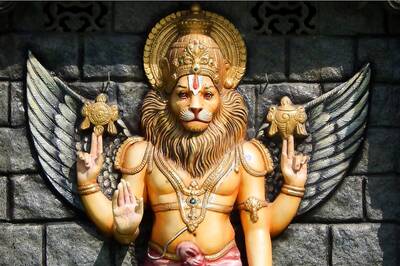
views
Guwahati: The Veterinary Experts Committee formed by the Assam government has brought some respite for Rani, Rupsingh, Babulal and Joytara — the four elephants that the state’s forest department planned to transport to Ahmedabad for the annual Rath Yatra festival at Jagannath temple on July 4.
After a report submitted by the committee on Wednesday stated that there is “every possibility of the elephants suffering heat stroke by any means of transport”, the forest department has decided to keep in abeyance its order on the proposed transportation of the jumbos.
“In terms of the Gauhati High Court order and in view of the prevailing heat-wave conditions prevailing in the north-west part of India, the permission granted under Section 40 (2) of the Wildlife (Protection) Act, 1972 for transporting the elephants from Assam to Gujarat is hereby kept in abeyance,” wrote Ranjana Gupta, principal chief conservator of forest (wildlife) and chief wildlife warden, in her submission to court on Thursday.
Speaking to News 18, honorary wildlife warden Kaushik Baruah appreciated the action taken by the forest department. “In spite of being under tremendous pressure, the forest department did what is best for the elephants,” said Baruah.
The team of experts comprising of five veterinary officers – Dr Pulin Chandra Das, Dr KK Sarma, Dr Bijoy Kumar Gogoi, Dr Pranjit Barua and Dr Debabrata Phukon – had said in their report that “evolutionarily, elephants as compared to humans or most of the mammals, have a very weak thermoregulatory system owing to presence of minimal sweat glands (only present above their toe-nails) and presence of intra-abdominal testicles which is otherwise external in case of most mammals. The body temperature of elephants is 37 degree Celsius and their comfort zone is 25-26 degree Celsius. On the other hand, the present weather conditions through which the elephants are proposed to be transported is found to be very hot (average temperature being 45 degree Celsius). Thus, there is every possibility of heat stroke of the elephants by any means of transport.”
Further, regarding other modalities of transport, the committee stated that regulations laid down by the Directorate of Project Elephant dated January 8, 2008 and Central Zoo Authority published in 2012 should be maintained in letter and spirit.
In a protocol laid down by the Central Zoo Authority, only adults and sub-adults should be transported as far as the selection of animals is concerned. Pregnant, geriatric, lactating, suckling, sick, weak, injured or deformed animals should be avoided in planned transport. But surprisingly, sources said that the male juvenile elephant Rupsing has a bullet injury on its left foreleg. However, the lame elephant was issued a fitness certificate by a veterinarian, and he was deemed ready for transport after being implanted with microchip.
Sources added that the bullet wound of Rupsing is yet to heal, while the female elephant Rani was found showing solitary syndrome by bobbing her head as she remained tied in chains. The guidelines also point out that the animal’s health and well-being should be given the highest priority during transport.
The court had directed the chief wildlife warden to file a fresh order by June 27, taking into consideration the concerns expressed by the petitioners. The petition was filed by Avinava Prayash, a Guwahati-based NGO represented by its secretary Urmi Mala Das and Nandini Baruah, a fashion designer who runs ‘Purr Paws Foundation’ for street animals in Guwahati. There are 10 respondents in the case, including the Assam government and the North East Frontier Railway.
















Comments
0 comment